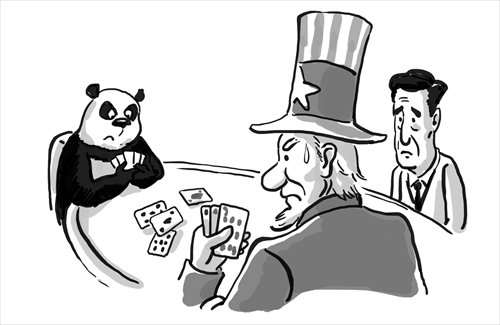Obama ready to trust Japan with Asian maritime safety

Illustration: Liu Rui/GT
Kicking off his visit to Japan, South Korea, Malaysia and the Philippines, US President Barack Obama is attempting to demonstrate that Washington has never veered from its "rebalancing to Asia" strategy. In October, Obama cancelled his trip to Asia because of the government shutdown, leaving some Asian countries disappointed and even wrathful.
Washington's global diplomacy seems to be losing its focus. Tackling regional affairs in the Middle East, notably US-Iran rapprochement, should have been a top priority on Obama's foreign policy agenda during his second term, which obviously calls for Russia's powerful backup. However, the Ukraine crisis has brought US-Russia relations to a freezing point. Obama's recent journey to Brussels has failed to stimulate the transatlantic partnership as hoped.
So, how about the Asia-Pacific region? Daniel R. Russel, US Assistant Secretary of State for East Asian and Pacific Affairs, has underlined on many occasions that "the Asia rebalance is here to stay." But it is also a fact that the Obama administration lacks adequate attention and policy resources to fully implement this strategy.
The "come home" pressure keeps growing among the US public and Congress. Department of State senior officials complained that because of budget slashing, the financial aid for Asia-Pacific countries between 2012 and 2013 declined by 19 percent compared with that between 2009 and 2010.
The US national defense budget was cut by $37 billion in 2013 and is projected to decline by 20 percent over the next decade based on the 2012 figure.
In early March, Katrina McFarland, US Assistant Secretary of Defense for Acquisition, stated that "Right now, the pivot is being looked at again, because candidly it cannot happen."
In an era of austerity, Washington is striving to seek opportunities for closer cooperation with capable allies and security partners to promote burden-sharing and burden-shifting. Military facilities, advanced weaponry technology and intelligence sharing as well as joint training have been major targets of collaboration.
It is expected that Obama will talk about the 2015 transition of wartime operational control with his South Korean counterpart during his stay in Seoul, and push forward military cooperation including the US military redeployment in the Philippines while in Manila.
There is no doubt that Japan dominates Obama's Asia trip this time. When US Defense Secretary Chuck Hagel visited Japan in early April, he expressed his support for Tokyo to exercise the right to collective self-defense and modify the "three principles" of arms export, which would prompt Japan to release its military strength. Washington also plans to deploy two additional Aegis destroyers with ballistic missile defense capabilities to Japan by 2017 to enhance military deterrence against Beijing and Pyongyang.
Furthermore, foreign ministers and defense chiefs of the two allies agreed to revise the bilateral defense cooperation guideline by the end of 2014.
The Obama administration is trying to turn Tokyo into the most important guardian of maritime safety in Asia. The two nations are likely to issue new initiatives, under which Japan will be able to provide maritime security equipment and training to the Philippines, Vietnam and other ASEAN member states.
Tokyo has been engaged actively in cooperation with Australia and India among others in military field. And Washington wishes to capitalize on the expanding bilateral security ties within Asia by giving full play to Japan's military capacities, in the hope to connect traditional allies with new partners like Myanmar.
As we are witnessing, a growing number of cooperation models involving US, Japan and one or more others are beginning to emerge.
Indeed, it is a daunting challenge for Washington to navigate Asia's complexities in security engagements, given Japanese Prime Minister Shino Abe's unwillingness to alter his confrontational attitude toward neighboring countries such as China and South Korea.
Against the backdrop of tense Tokyo-Beijing and Tokyo-Seoul relations, the US urging Japan to play a greater security role in the Asia-Pacific region may further deepen the security dilemmas in Northeast Asia.
The author is a research fellow with the Charhar Institute and an adjunct fellow with the Center for International and Strategic Studies, Peking University. opinion@globaltimes.com.cn